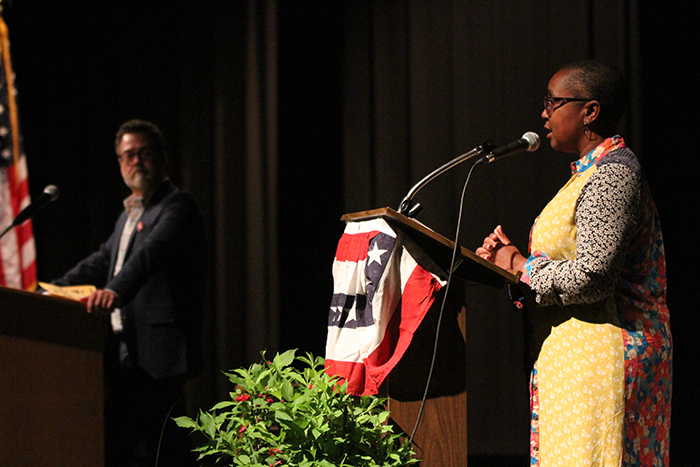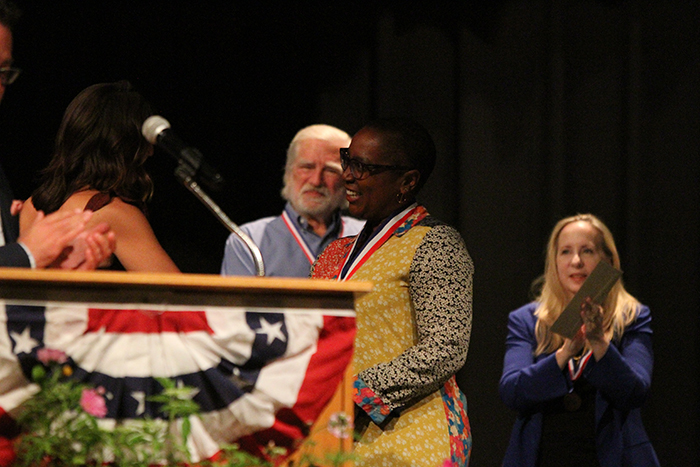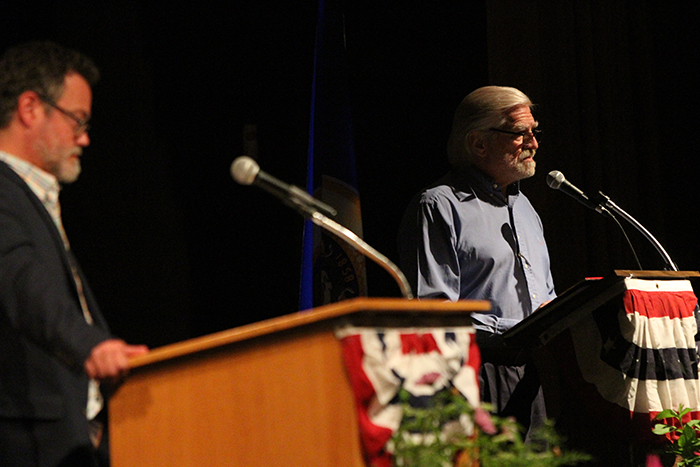Freedom of Speech is worth the cost
News | Published on June 13, 2024 at 4:12pm GMT+0000 | Author: Tucker Henderson
0
Michelle Mellon defeated David Lapakko in the finals of the 31st annual Great American Think-Off on Saturday night by arguing the Freedom of Speech is worth the cost.
By Chad Koenen
Publisher
Freedom of Speech is worth the cost, at least that was the decision of the more-than 100 people who attended the 31st annual Great American Think-Off at the New York Mills High School on Saturday night.

Michelle Mellon, a New Mexico resident, was crowned as America’s greatest thinker and winner of the Great American Think-Off. She was the lone finalist who was not from Minnesota.
The Great American Think-Off winner currently works as a brand communications and marketing consultant from her home in southwestern New Mexico. She earned a BA in English from the College of William and Mary and an MA in Liberal Studies from Georgetown University. In her spare time, Mellon is an author of award-winning speculative short fiction books, including two short story collections and dozens of story publications for anthologies, magazines and a podcast.

In her closing argument, Mellon said the Constitution enshrines the right for the Freedom of Speech and individuals shouldn’t consider the overall cost of ensuring that freedom is protected, but should look at the value of ensuring people can speak as freely as they desire.
“Instead of looking at cost we should look at value, or worth, because value is what people are willing to pay,” she said.
Mellon said a minority of people view the Freedom of Speech as a bomb that can be dropped and utilized to enhance their viewpoints without regard to who they may harm in the process.
“If we are bold enough and brave enough to address what is actually happening and aim for the ideal,” she said of the importance of maintaining the freedom of speech at all cost.
In the finals, Mellon defeated David Lapakko, who is from Richfield, Minn. and argued that the freedom of speech was not worth the cost.
Lapakko, who has been named as a finalist for the Great American Think-Off four times, used conspiracy theories regarding things like the Sandy Hook school shotting, the 2020 election being “stolen” and the Baltimore bridge being sabotaged by a hacker.
“Unfortunately, those stories are not typically built around evidence they are not built around facts. They are narratives,” he said arguing in his closing statements. “Lets get to facts and not just stories.”
In the opening round of the night, Crystal Kelley and Mellon contended that freedom of speech was worth the cost.
Mellon won the opening round of the debate by stating that freedom of speech is worth the cost as it gives individuals the right to speak as much, or as little as they desire, to share their thoughts and words. She said some people feel the cost of freedom means a war, but having the Freedom of Speech allows people the right to protest or share their opinions.
“Often, when people refer to the ‘cost’ of Freedom of Speech they mean lives. In war, in protest, in acts of revenge or ungoverned and unrepentant wrath, in the incitement to action, whether through measured discourse or a more instinctive response. Naturally, that begs consideration of whether/how we moderate speech, like criminalizing yelling fire in a crowded theatre. Which, by the way, is not a real thing, although there are true restrictions on speech that do exist in this country,” she said. “As proud as we are of being ‘one nation…Indivisible,’ we are equally proud of being a nation of individuals. So, I think we need to ask this question a different way. What’s the cost to us without freedom of speech?”
Even with access to all of the resources in the world, Mellon said some people would still choose to be ignorant and not want to hear the ideas of other people. She used the example of women and marginalized people like from the LGBTQ plus groups who remain silent for fear of retribution for speaking out.
“To me, Freedom of Speech is ensuring that everyone has a voice, however uncomfortable it may be to do so. I might agree wholeheartedly with what they say. I may question their ideas, process, or motives. Or I might find everything they say repugnant and offensive,” she said. “But it may spark in me my own freedom to refute, refine, or realize a vision or innovation in response to their words.”
In her essay, Kelley stated that the Freedom of Speech doesn’t shield individuals from judgment, yet protects people from censorship.
“Our right to free speech doesn’t shield us from judgment by family, friends or neighbors. It doesn’t prevent a private company from hurting us. It doesn’t protect us from hearing speech we don’t like. It protects us from forced compliance with government-controlled censorship and governmental retaliation for speaking against authority,” said Kelley.
She went on to say American elections allow for frequent power shifts, but the free speech rights guarantee allows people the ability to criticize government without the threat of retaliation. As the nation wrestles with the cost of free speech, Kelley said it remains important to be able to speak freely without the fear of the government censoring the public.
“Our nation is grappling with this cost of free speech. We’re very concerned about upsetting people. Instead of supporting people’s silencing those whose speech offends them, we should encourage them to speak right back. And we must speak, even if it hurts,” said Kelley. “Our government holds awesome power. It’s the nature of those who have power to keep it. Without the citizenry’s right to speak freely, power will naturally become totalitarian. Americans conducted a revolution to remove the gilded boot of a king from their collective necks. They knew enshrining freedom of speech would help protect the new republic from future totalitarianism.”
In the second round of the debate, Lapakko defeated Bill Sutherland in the stating Freedom of Speech was not worth the cost.
In speaking against the cost of Freedom of Speech, Lapakko contended 20 years ago he would have felt differently, but the change in how journalists report on stories has changed the landscape of the Freedom of Speech. He said in the past journalists made sure to get facts straight and did their best to be a trusted source, but today, they have been called the “enemies of the people” and are no longer viewed as a reliable source of information from far extreme political parties.
“However, it’s now 2024, and the landscape has changed, perhaps forever. In many ways, the tradition principles of Freedom of Speech have become a relic of the past. Before electronic and social media, people couldn’t instantly post something reaching millions of others just because they wanted to. Prior to social media, Freedom of Speech at least had some guardrails, but today there is only more convenient speech,” he said. “Now all you need are a couple of thumbs tapping out 280 characters, with no need to support anything in the message with actual evidence. That’s a prescription for disaster. In our society, ‘freedom’ is almost a religious term, an unqualified virtue. But freedom without responsibility is its own form of tyranny. Currently we are victimized by people who only care bout the freedom to lie and mislead.”
Lapakko said he is a proponent of the First Amendment ensuring the freedom of the press and Freedom of Speech, but there should be restrictions put in place as the cost is not always worth having the right to speak whatever a person desires.
“I am a big advocate for the First Amendment. I don’t want to see it abolished. But until something beyond ‘freedom’ guides our irresponsibly reckless behavior, I must conclude—quite reluctantly—that it’s costing us too much,” he said. “Currently, Freedom of Speech is doing more harm than good.”
Sutherland contended that the cost of the Freedom of Speech is not worth the cost as the cost itself is not a measurable item.
“Freedom of Speech is of immeasurable value, but it is not worth nearly the cost that our society has assigned to it. The simple reason is that this cost is misapplied. It very often does not actually attach to Freedom of Speech, but rather to the systemic absence of freedom to be heard,” he said.
Sutherland relied on personal experiences to illustrate that Freedom of Speech is short-circuited by the absence of the freedom to be heard. He even relayed an example of when he approached a city council about a nature preserve that was in the way of a proposed paved road. Not only did he feel unheard about his concerns, but he said a city official even insulted and degraded him at length during the city council meeting.
“The United States has enshrined Freedom of Speech in the very first amendment to the Constitution, and I feel certain that the founders knew full well that for all of its value, some predictable cost would accrue. But nothing like the grossly excessive cost we see on the streets or the Internet today,” he said. “The fix is simple, but clearly not easy. First, assign this cost to where it rightfully belongs, not to Freedom of Speech, but to absence of freedom to be heard. Second, commit to not be our own enemy, but instead to recast our society, and therefore also our government into one that genuinely adopts a core tenet of the late Stephen Covey of ‘7 Habits’ fame: To listen, not just with the intent to reply, but with the intent to understand.”
About the Great American Think-Off
Now in its 31st year, The Great American Think-Off is an exhibition of civil disagreement between powerful ideas being explored by everyday people. Designed to bring philosophy down from the ivory towers of academia and make it accessible for all, the contest has received national acclaim including coverage by C-SPAN, the New York Times, and The Today Show.
The Cultural Center, located in the rural farming and manufacturing town of NY Mills, sponsors this annual philosophy contest and encourages people of all ages and backgrounds to participate. The Cultural Center is a rural hub for creativity, community vitality, and lifelong learning in the arts. Since our incorporation in 1990, we have been passionate about connecting people to artists and rich cultural experiences in rural Minnesota, celebrating the local and being a window to the world.
